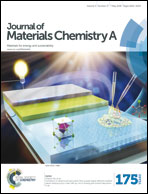Precious-metal-free Co–Fe–Ox coupled nitrogen-enriched porous carbon nanosheets derived from Schiff-base porous polymers as superior electrocatalysts for the oxygen evolution reaction†
Abstract
Water splitting provides a potential path for producing clean, renewable H2 and O2. However, improving the overall efficiency of water splitting is a challenging issue. Here, we designed Co–Fe nanoparticle coupled nitrogen-enriched porous carbon (CoyFe10−yOx/NPC) nanosheets as highly efficient non-precious-metal electrocatalysts for the oxygen evolution reaction (OER). Nitrogen-enriched porous carbon (NPC) nanosheets were prepared using a Schiff-base network (SNW) as the precursor and the SNW was based on commercially available and inexpensive monomers which were terephthalaldehyde and melamine. The resulting SNW possessed a high nitrogen content, a high surface area and a high density of metal-coordination sites. In addition, when used as the catalyst for the OER, the Co–Fe nanoparticle catalyst containing 30% Co (Co3Fe7Ox/NPC) showed the highest activity, requiring 328 mV over-potential to achieve a stable current density of 10 mA cm−2 for at least 15 h and a small Tafel slope of 31.4 mV dec−1 in 1.0 M KOH solution, which were comparable even superior to those of many other non-noble metal catalysts. Consequently, the high efficiency and durability make these supported amorphous Co–Fe nanoparticles potentially applicable for improving the performance for electrolysis of water and energy storage applications. More importantly, the support of electrode materials comes from the pyrolysis of porous polymers and this idea offers a new possibility for exploring overall water splitting non-precious-metal catalysts.


 Please wait while we load your content...
Please wait while we load your content...